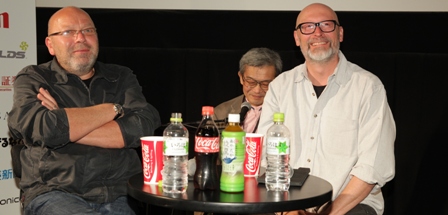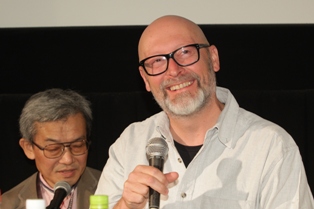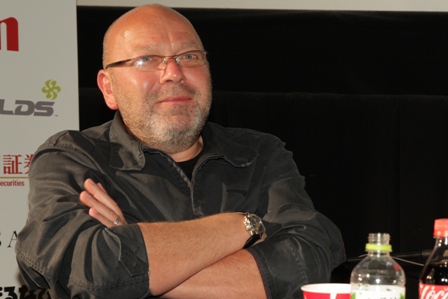The Mighty Angel press conference

Wojtek Smarzowski’s “The Mighty Angel” screening in the Competition Section, doesn’t pretend to be the last cinematic word on alcoholism, but it definitely takes familiar ideas explored in previous dramatic works concerning addiction to their direct extremes. As the director pointed out during the press conference that followed the film, alcoholism is a common element in many Polish films, and it was his intention to make it “the main theme” in this case. In other words, the movie is about nothing else. It’s a hard movie to watch. In fact, some people may need a stiff drink afterwards.
The protagonist, a successful writer named Jerzy (Robert Wieckiewicz), is a kind of serial survivor. He goes on elaborate binges that end up with his apartment in shambles, his bank account depleted, and his naked body sprawled in front of the toilet or in the bathtub, just waiting for some public emergency personnel (police, paramedic, building super) to find him and send him to a public rehabilitation facility. Most of the movie takes place in this facility, a snake pit lorded over by a tough-love doctor where Jerzy’s fellow drunks usually seem much worse off than him, because, of course, Jerzy, being an intellectual who can spout Kafka and see behind Nabokov’s “lies”, knows himself better than they know themselves.
But actually he doesn’t, which is Smarzowski’s point. “I wanted to show that the problem of alcoholism is a democratic one,” he said. “It affects everyone in the same way, whether man or woman, young or old, rich or poor.” As the movie progresses, it becomes obvious that much of what we see on screen is in Jerzy’s head, situations invented to justify his drinking habit. Smarzowski’s method is to mix styles and formats at a dizzying pace so that the viewer can never find his bearings and thus isn’t sure if what he is seeing is “reality” or Jerzy’s imagination. “This is not a realistic film,” the director stressed. “It is how the world is seen by an alcoholic.”

In one bravura segment, the stories that Jerzy’s co-addicts relate during their AA-like sessions are revealed to be phoney: narratives that Jerzy himself wrote for them because either the reality is too common or they just can’t remember. He writes for them dramatic tales of poverty, political subservience, and domestic abuse, when, in truth, they were simply slaves to the bottle. But then Smarzowski pulls a fast one: maybe these stories themselves are all figments of Jerzy’s mind, romantic versions of the miserable Polish drunk, which the director said was always “the image of drinking cheap wine and sleeping under the bridge.” The reality is much worse, because is has nothing to do with class or gender or age: it’s about sickness, which Jerzy won’t acknowledge.

The incidents, which are often very graphic, come fast and sharp. “I like mixing techniques and styles,” Smarzowski said. “Some of the situations I took directly from the original novel, but some were also my own observations.” However, he was quick to point out that at no time was he or any of the actors drunk during the shooting, an assertion the assembled journalists may have found hard to believe considering the extent of the verisimilitude.
One journalist even questioned the use of vomit, which is plentiful, and another remarked on a scene in which a movie director, soused to the gills while attending a film festival party, wets his pants while talking to a big American producer. Was that based on some true story?
“That anecdote was not in the book,” Smarzowski explained, and added in a wry tone, “It was something I heard about from a third person.”
























